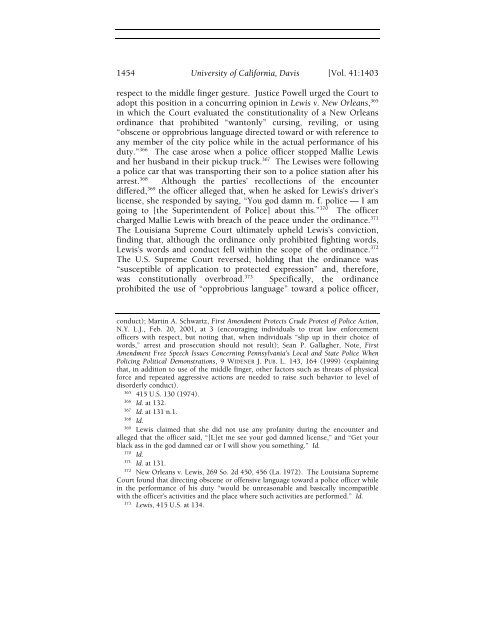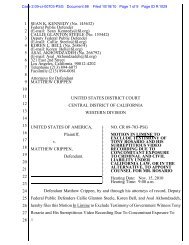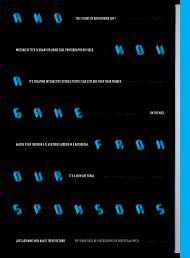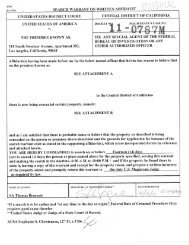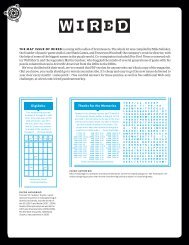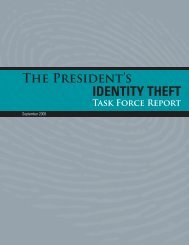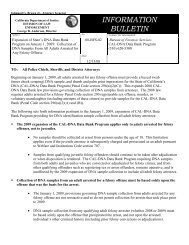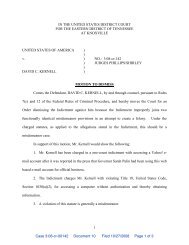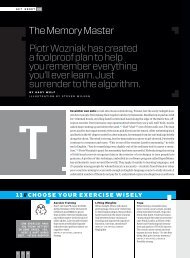Digitus Impudicus: The Middle Finger and the Law - Wired
Digitus Impudicus: The Middle Finger and the Law - Wired
Digitus Impudicus: The Middle Finger and the Law - Wired
Create successful ePaper yourself
Turn your PDF publications into a flip-book with our unique Google optimized e-Paper software.
1454 University of California, Davis [Vol. 41:1403<br />
respect to <strong>the</strong> middle finger gesture. Justice Powell urged <strong>the</strong> Court to<br />
adopt this position in a concurring opinion in Lewis v. New Orleans, 365<br />
in which <strong>the</strong> Court evaluated <strong>the</strong> constitutionality of a New Orleans<br />
ordinance that prohibited “wantonly” cursing, reviling, or using<br />
“obscene or opprobrious language directed toward or with reference to<br />
any member of <strong>the</strong> city police while in <strong>the</strong> actual performance of his<br />
duty.” 366 <strong>The</strong> case arose when a police officer stopped Mallie Lewis<br />
<strong>and</strong> her husb<strong>and</strong> in <strong>the</strong>ir pickup truck. 367 <strong>The</strong> Lewises were following<br />
a police car that was transporting <strong>the</strong>ir son to a police station after his<br />
arrest. 368 Although <strong>the</strong> parties’ recollections of <strong>the</strong> encounter<br />
differed, 369 <strong>the</strong> officer alleged that, when he asked for Lewis’s driver’s<br />
license, she responded by saying, “You god damn m. f. police — I am<br />
going to [<strong>the</strong> Superintendent of Police] about this.” 370 <strong>The</strong> officer<br />
charged Mallie Lewis with breach of <strong>the</strong> peace under <strong>the</strong> ordinance. 371<br />
<strong>The</strong> Louisiana Supreme Court ultimately upheld Lewis’s conviction,<br />
finding that, although <strong>the</strong> ordinance only prohibited fighting words,<br />
Lewis’s words <strong>and</strong> conduct fell within <strong>the</strong> scope of <strong>the</strong> ordinance. 372<br />
<strong>The</strong> U.S. Supreme Court reversed, holding that <strong>the</strong> ordinance was<br />
“susceptible of application to protected expression” <strong>and</strong>, <strong>the</strong>refore,<br />
was constitutionally overbroad. 373 Specifically, <strong>the</strong> ordinance<br />
prohibited <strong>the</strong> use of “opprobrious language” toward a police officer,<br />
conduct); Martin A. Schwartz, First Amendment Protects Crude Protest of Police Action,<br />
N.Y. L.J., Feb. 20, 2001, at 3 (encouraging individuals to treat law enforcement<br />
officers with respect, but noting that, when individuals “slip up in <strong>the</strong>ir choice of<br />
words,” arrest <strong>and</strong> prosecution should not result); Sean P. Gallagher, Note, First<br />
Amendment Free Speech Issues Concerning Pennsylvania’s Local <strong>and</strong> State Police When<br />
Policing Political Demonstrations, 9 WIDENER J. PUB. L. 143, 164 (1999) (explaining<br />
that, in addition to use of <strong>the</strong> middle finger, o<strong>the</strong>r factors such as threats of physical<br />
force <strong>and</strong> repeated aggressive actions are needed to raise such behavior to level of<br />
disorderly conduct).<br />
365 415 U.S. 130 (1974).<br />
366 Id. at 132.<br />
367 Id. at 131 n.1.<br />
368 Id.<br />
369 Lewis claimed that she did not use any profanity during <strong>the</strong> encounter <strong>and</strong><br />
alleged that <strong>the</strong> officer said, “[L]et me see your god damned license,” <strong>and</strong> “Get your<br />
black ass in <strong>the</strong> god damned car or I will show you something.” Id.<br />
370 Id.<br />
371 Id. at 131.<br />
372 New Orleans v. Lewis, 269 So. 2d 450, 456 (La. 1972). <strong>The</strong> Louisiana Supreme<br />
Court found that directing obscene or offensive language toward a police officer while<br />
in <strong>the</strong> performance of his duty “would be unreasonable <strong>and</strong> basically incompatible<br />
with <strong>the</strong> officer’s activities <strong>and</strong> <strong>the</strong> place where such activities are performed.” Id.<br />
373 Lewis, 415 U.S. at 134.


